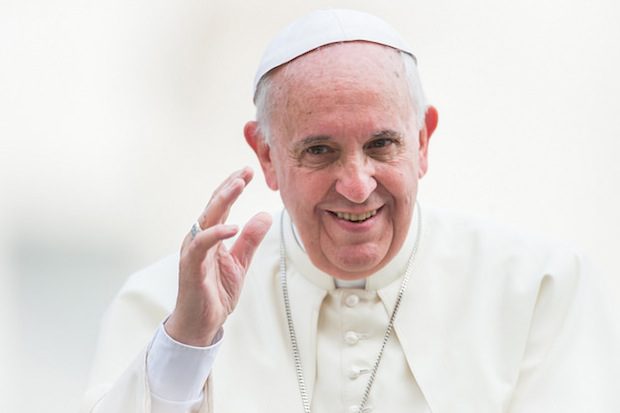The Obamafication of Pope Francis

Lots of Catholic news in the past few days. In case you missed it, Pope Francis cashiered Cardinal Burke over the weekend, as was widely expected. Last week, Cardinal Reinhard Marx, one of the pontiff’s closest advisers, gave an interview in which he said that Pope Francis had insisted that the final report of the recent Synod include the paragraph liberalizing the Church’s stance on homosexuality, despite its failure to win over the required number of bishops. Cardinal Marx says that reports of the progressives’ defeat at the Synod are greatly exaggerated. Excerpt:
“No, this pope has pushed the doors open and the voting results at the end of the synod will not change that,” he said. Cardinal Marx added that it is in the coming year before the next session of the Synod that “the real work is about to begin.”
Despite media reports to the contrary, Marx said the “progressive” group at the Synod had not suffered any setbacks, and cited the pontificate of Francis as proof. “Anyone who comes to that conclusion has not had their eye on what has been going on in our church over the past one and a half years,” Marx said.
Also last week, Pope Francis solidified his canonical power to fire bishops directly. This could be a good thing if it spurs him to get rid of bishops who tolerate sexual abuse and coverup (though it will require him to act; if he has moved to make even more clear his papal authority over the bishops, but does not use it, people will rightly want to know why not). But will he deploy that authority for less defensible reasons? We shall see.
Where does this leave Francis? Looking a bit like ‘the Hamlet Pope’, Paul VI, whom he has beatified. He supports some sort of reform, but uncertainty is breaking the church into factions reminiscent of the Anglican Communion. Old enemies of Benedict XVI reckon they can persuade Francis to stack the college of cardinals in their favour. Meanwhile, Burke has emerged as leader of the hardline traditionalists. ‘He did not want this role but perhaps he sees himself as a St John Fisher figure,’ says one Vatican source, a comparison that casts the successor of Peter in the role of Henry VIII.
What should worry Francis is that moderate conservative Catholics are losing confidence in him. The New York Times columnist Ross Douthat, who is no one’s idea of an extremist, believes that ‘this pope may be preserved from error only if the church itself resists him’. Cristina Odone, former editor of theCatholic Herald, says that ‘Francis achieved miracles with his compassionate, off-the-cuff comments that detoxified the Catholic brand. He personifies optimism — but when he tries to turn this into policy he isn’t in command of the procedures or the details. The result is confusion.’
All of which suggests a far closer analogy than with Henry VIII. There is another world leader, elected amid huge excitement, who has surprised and disappointed the faithful by appearing disengaged and even helpless in moments of crisis. This is an awful thing to say, but we could be watching Jorge Bergoglio turn into Barack Obama.
The Catholic writer James Kalb has a short but astute assessment of the two big progressive players in this drama: Pope Francis and Cardinal Walter Kasper. Kalb nails why the outcome of the turmoil in the Catholic Church matters a great deal to all of us social and religious conservatives in the West:
All of which seems to leave the Church in the position she’s been for the past 50 years from the standpoint of a social traditionalist, only more so: largely useless at the practical sociological level, but nonetheless ultimately and in principle the only fixed point from which the inhumanity of the modern world can be opposed and overcome. That view depends, of course, on the view that reality and truth, and thus doctrine, are what matter in the long run.
Subscribe for as little as $5/mo to start commenting on Rod’s blog.